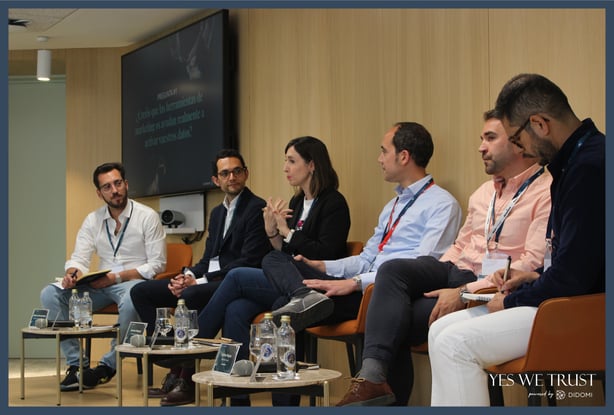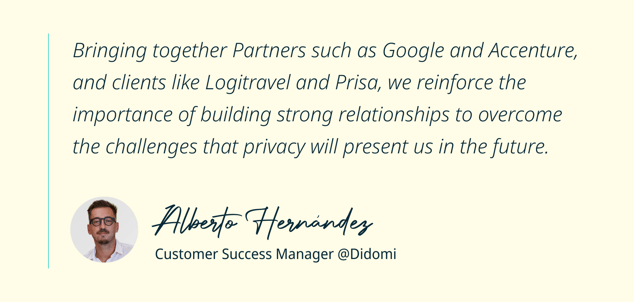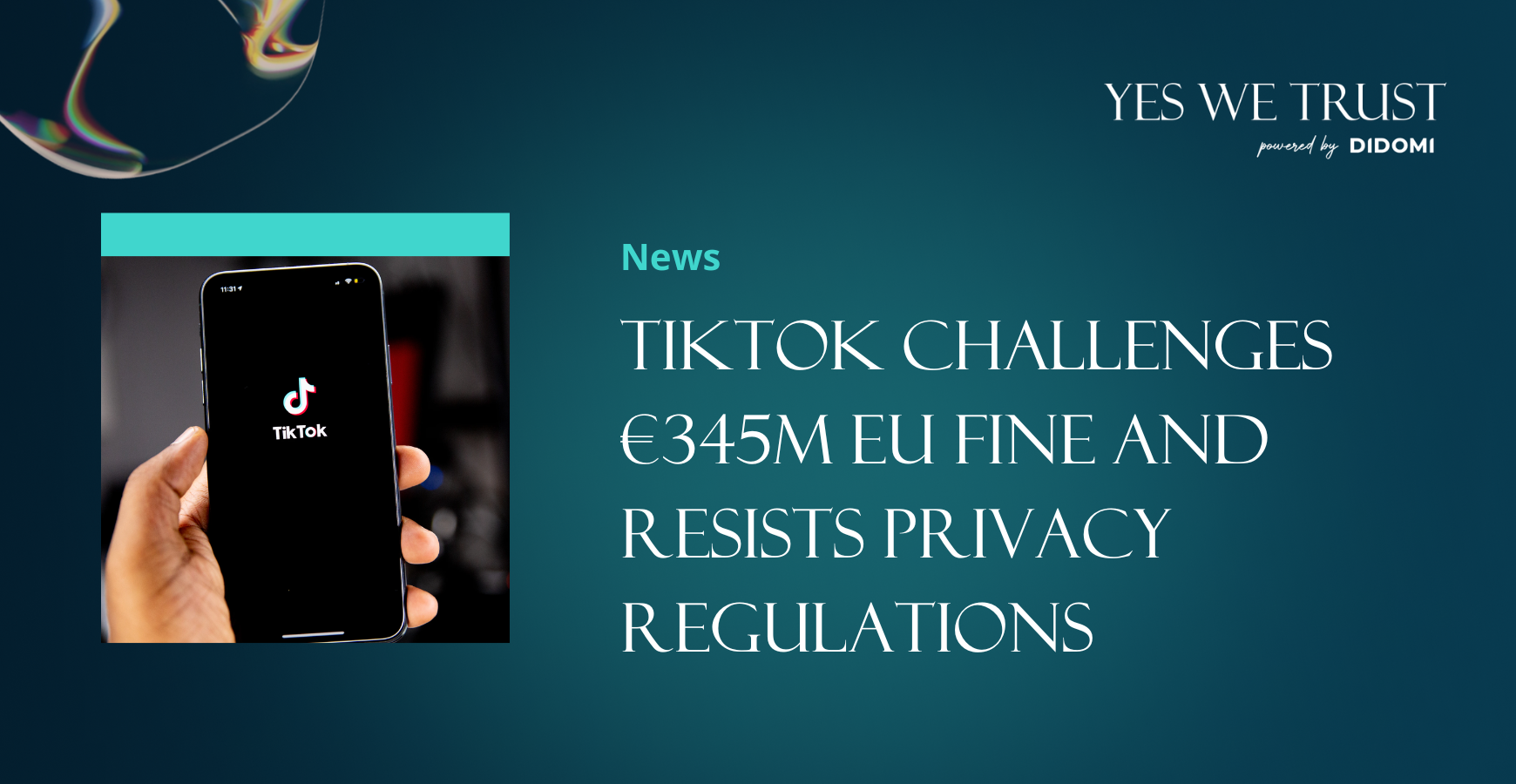Summary
The Yes We Trust community recently hosted a Roundtable discussion at the Accenture Madrid Innovation Hub.
Having chosen an ambitious topic for debate “Data activation: quantity or quality?”, we were fortunate to secure an impressive and experienced group of speakers:
.png?width=634&height=357&name=Speakers_1%20(2).png)
Key takeaways: what does the future hold?
Nicolás Lozano: The user experience should be the main driver of any “Quality vs Quantity” considerations. In other words, as a business, what do you want to offer your users in order to achieve your desired results?
Lorena Roque: The “cookieless future” is happening now, where we are only using 60% of data available. In facing the future of marketing, companies should opt for clear and transparent privacy policies, a shift toward first-party data, and technologies that can measure and predict.
Sergio Martinez de Cestafe: The user is ultimately the decision-maker, and it is up to a company to make a compelling argument for consent and convince the user that their overall experience will be better for it.
Carlos Rojas: The future is about “life-centricity”. Just like with any coffee bar order today, there are as many types of coffee drinks as there are people. It’s not about “one coffee for everyone”, but rather trying to know and understand users in their full spectrum of interests and always respecting their needs.
Sergio Gómez: The future is all about placing your customers at the center of your strategy.
The context
In a world where it is now increasingly harder to access data, businesses are facing challenges from different areas.
First, from a legal point of view, we are facing an increasingly complex regulatory landscape, with, new laws and regulatory updates are popping up every month.. To make things even more complex, each country comes with its own particular requirements, making worldwide compliance an incredibly tough challenge.
From a technical standpoint, things are not any easier. The age of third-party data is coming to an end, as our digital environment is less and less hospitable to big data management.
Last but not least, consumer behavior is experiencing a transformation, with the paradox of customers expecting personalized journeys, while being reluctant to share their data: there is a major trust issue waiting to be solved.
For all of these reasons, data are losing both quantity and quality, with a high potential impact on performance monitoring and monetization.
Given our common challenge, how can we address change and more efficiently activate data to drive website monetization?
Our panel, led by Alberto Hernández, brought their insight and expertise to help us address three key questions:
1. Do marketing tools really help to activate data?
2. What are the most important sources of data for insight into your customers?
3. At a time when privacy and regulations are increasingly important, do you go for Quality or Quantity?
Roundtable recap

Question 1: Do marketing tools really help to activate data?
There is little doubt that marketing tools are vitally important drivers of data activation. The problem often lies in what Nicolás Lozano termed the “frustration vs. value” factor, i.e., coordinating among diverse teams in order to overcome the frustration that such tools can cause and obtain value.
Another major challenge is connecting these tools among themselves as part of a marketing stack in order to adapt to each business as well as third-party requirements. Such stacks tend to be highly bespoke, with specific technology used for each area. This ultimately does not benefit the end-user as it encourages siloing and disconnection.
The discussion around marketing tools highlighted two important figures who are gaining prominence: the DPO and the Chief Privacy Officer.
All panel members agreed on the importance of including the DPO in conversations right from the start so that both legal and business perspectives can be shared from the beginning, minimizing the risk that projects become stalled or parked. Using a “common language” in discussions can go a long way to facilitate discussions.
Carlos Rojas highlighted an important “culture” issue that is proving rather transformational, with user respect and privacy-by-design now playing a major role. Incorporating checkpoints in process and methodology frameworks can help to ensure compatibility with a company’s business goals.

Question 2: What are the most important sources of data for insight into your customers?
Websites themselves figure prominently here and, when it comes to high volume sites, there is potential for a high degree of granularity. However, managing data across thousands of devices has its challenges, something that is made more complex across different geographies. When it comes to regional specifics across a digital landscape, every single user action taken on a consent banner (or no action taken at all) represents a significant impact on a business model.
For Sergio Martinez de Cestafe, more than any single source the challenge is really about connecting across sources whilst respecting privacy. On a website, this is obviously easier, while in the context of a phone call it becomes more complicated and one may become contingent on another (for example, phone contact contingent on consent provided beforehand online).
The evolution of data privacy regulation plays a key role here. Pre-regulation, an “anything goes” attitude prevailed. The introduction of data privacy laws then made companies wary of tracking and measuring data. Now, fear in the face of regulation has given way to respect for privacy as a brand strategy in itself. So we are in a situation where criteria is important but the data will be better for it.
Privacy is also linked to brand value. In other words, users who trust a brand are more likely to give their consent. So not only do users need to feel in control of what a company is doing with their data but, more importantly, they need to see the benefits, i.e, “will I get in return?”.
This reinforces the challenge at hand, since while it is true that third-party cookies are set to disappear, others will emerge. For this reason, a streamlined approach facilitates not only the distribution of data and consent but respect of user privacy itself. Crucially, there is no impact on marketing processes. In fact, such processes tend to thrive more than they would without streamlined management, with consent banners enhancing - not blocking - the user experience.
We are now evolving away from cookies and towards the concept of “preferences” and this is truly a world where users have control. Users will no longer just be accepting or rejecting cookies: beyond telling a business how their data can be used, they will be telling that business how, how often, when and why they wish to be contacted. This information will be of key value to a business.

Question 3: At a time when privacy and regulations are increasingly important, do you go for Quality or Quantity?
The group all agreed that, at the end of the day, Quality is the priority, even at risk of losing quantity. It is the user experience that matters most. However, this can be deeply nuanced, given the enormous challenge of effectively communicating privacy and consent to users and how consent is displayed and requested.
Even with a Quantity-first approach, quite another matter is knowing how to leverage the information you collect, which can often lead to loads of data in silos without a business knowing what it means or how to use it, despite its relevance or potential. According to Lorena Roque, over 80% of today’s marketing campaigns are automated, whereas 15 years ago everything was manual. So it’s about taking your campaign data, enriching this with analytics data and connecting this with your company data. When this is done right you can increase revenue by 20%.
For Sergio Gómez, it is also a question of focus. Marketing has evolved to a consumer-based model where the user is at the center of your strategy. So you can have a huge database but no way to contact people cause they haven’t given their consent. The idea is to activate this database and gain quality. We now talk about customers, not numbers, about preferences, not cookies. Companies need to be creative and leverage different ways to reach people.
When it comes to forming bonds and tapping into user preferences and interests to obtain high quality data, Nicolás Lozano envisions a “triangle” process: collect user info, distribute consent, and gain new business. Here, registered vs. non-registered users is a key factor, and that’s where Preferences really matter, i.e., directly asking users what they want, asking their preferences on any topic, from what news they want to read to what travel destinations interest them.
User-given data paves the way for segmentation, creates greater trust, and allows a business to manage thousands of users yet treat each single user personally.
Companies are moving fast and upping the game, investing in technology such as apps that not only add value to customers and keep them registered on a site, but which also attract the interest of non-customer leads, allowing a business to gain even more data. For example, why visit a website and search for each product when you can start with an app that asks you about your needs and interests, and then recommends products for you?
Check out our event video!
Audience questions
Having this roundtable during a physical event allowed us to have a rich conversation with our audience. Here are two of the most interesting questions that came up:
Are we going to come up short with respect to ensuring that younger generations understand and respond to our data strategies?
For Lorena Roque, it has nothing to do with age. Consent and cookies are poorly understood in general, and a combination of clear explanations and creating incentives and perceived benefits will be highly effective in gaining customers and even turning poor first impressions into repeat customers.
We are used to asking and not giving in return, and this needs to change.
How will the future of data change in terms of usability and how will users be interacting with data privacy?
This is a challenge that more and more businesses are addressing in terms of Preferences Management. Today’s children are pure digital natives and there will be different forms of measurement and monetization for which we need to find solutions.
We are also heading towards unique log-ins and single sign-on. While this may sound appealing to the end-user, there is a clear risk of monopoly.
In contrast, the idea of “profiles”is also a possibility, i.e., users may create different accounts for different relationships (business, personal, etc.) with a brand. With the potential to end up with multiple roles for a single person, understanding who exactly is the “master user” could get murky.
Essentially, it comes down to educating users and customers: we want to be in control of our own privacy management, and with a future full of digital natives, we need awareness around the fact that privacy is ours to manage.







